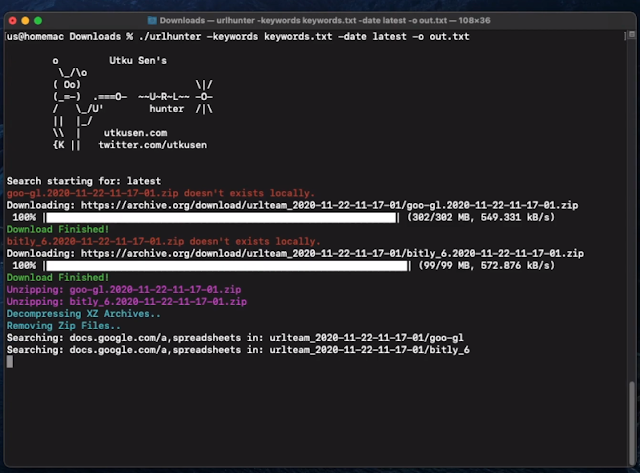Urlhunter – A Recon Tool That Allows Searching On URLs That Are Exposed Via Shortener Services

urlhunter is a recon tool that allows searching on URLs that are exposed via shortener services such as bit.ly and goo.gl. The project is written in Go.
How?
A group named URLTeam (kudos to them) are brute forcing the URL shortener services and publishing matched results on a daily basis. urlhunter downloads their collections and lets you analyze them.
Installation
From Binary
You can download the pre-built binaries from the releases page and run. For example:
tar xzvf urlhunter_0.1.0_Linux_amd64.tar.gz
./urlhunter --help
From Source
- Install Go on your system
- Run:
go get -u github.com/utkusen/urlhunter
Note For The Windows Users: urlhunter uses XZ Utils which is pre-installed on Linux and macOS systems. For Windows systems, you need to download it from https://tukaani.org/xz/
Usage
urlhunter requires 3 parameters to run: -keywords, -date and -o.
For example: urlhunter -keywords keywords.txt -date 2020-11-20 -o out.txt
-keywords
You need to specify the txt file that contains keywords to search on URLs. Keywords must be written line by line. You have three different ways to specify keywords:
Single Keyword: urlhunter will search the given keyword as a substring. For example:
acme.com keyword will both match https://acme.com/blabla and https://another.com/?referrer=acme.com
Multiple Keywords: urlhunter will search the given keywords with an AND logic. Which means, a URL must include all the provided keywords. Keywords must be separated with , character. For example:
acme.com,admin will match https://acme.com/secret/adminpanel but won’t match https://acme.com/somethingelse
Regex Values: urlhunter will search for the given regex value. In the keyword file, the line that contains a regular expression formula must start with regex string. The format is: regex REGEXFORMULA. For example:
regex 1d{10} will match https://example.com/index.php?id=12938454312 but won’t match https://example.com/index.php?id=abc223
-date
urlhunter downloads the archive files of the given date(s). You have three different ways to specify the date:
Latest: urlhunter will download the latest archive. -date latest
Single Date: urlhunter will download the archive of the given date. Date format is YYYY-MM-DD.
For example: -date 2020-11-20
Date Range: urlhunter will download all the archives between given start and end dates.
For example: -date 2020-11-10:2020-11-20
-o
You can specify the output file with -o parameter. For example -o out.txt
Demonstration Video
The Speed Problem
Archive.org throttles the speed when downloading files. Therefore, downloading an archive takes more time than usual. As a workaround, you can download the archives via Torrent and put them under the archive/ folder which is located in the same directory with the urlhunter’s binary. The directory tree will look like:
|-urlhunter
|---urlhunter(binary)
|---archive
|-----urlteam_2020-11-20-11-17-04
|-----urlteam_2020-11-17-11-17-04
Example Use Cases
urlhunter might be useful for cyber intelligence and bug bounty purposes. For example:
docs.google.com/a/acme.com drive.google.com/a/acme.com keywords allow you to find public Google Docs&Drive share links of Acme company.
acme.com,password_reset_token keyword may allow you to find the working password reset tokens of acme.com
trello.com allows you to find public Trello addresses.
Thanks
Special thanks to Samet(@cyanpiny) who gave me the idea of this tool.
If you like the site, please consider joining the telegram channel or supporting us on Patreon using the button below.


